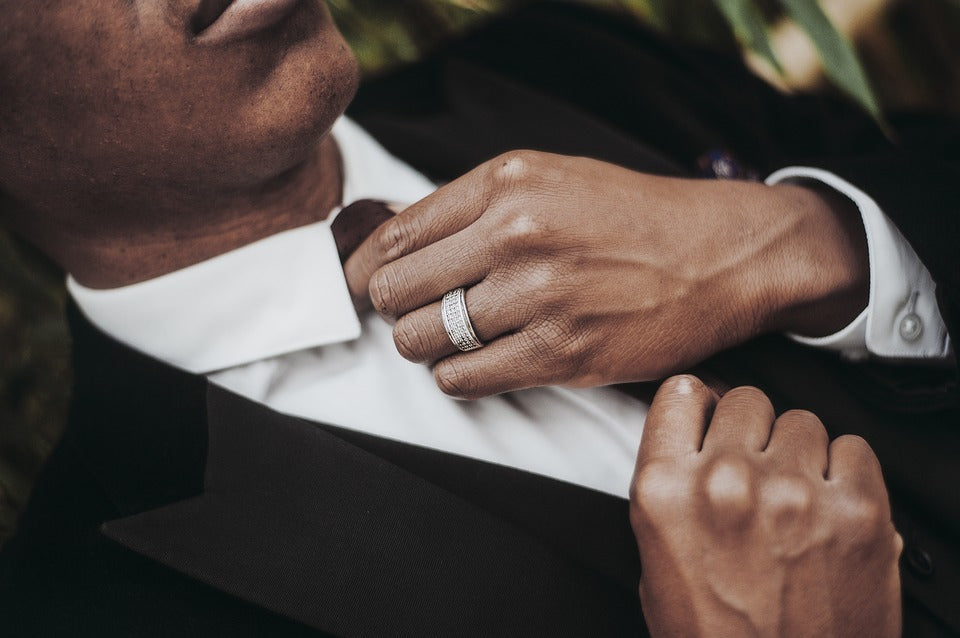Men's
formal business attire typically calls for a suit. Women have more options when it comes to their business attire, though men are usually required to wear a suit. The right suit enhances the wearer's appearance, creating a more clean and concise look that's perfect for the workplace. When wearing a business suit, however, you should avoid making the following mistakes.
Overlooking the Accessories
Accessories can make or break the appearance of a business suit. It's important to wear the right accessories in order to achieve a formal business appearance. Some accessories that work well for men's suits -- when worn for business purposes -- includes a metal-band wristwatch, cufflinks, and a pocket square. Anything else is usually overboard, so stick with the basics to ensure a proper appearance.
Wearing the Wrong Shoes
Of course, you should also wear the right shoes with your suit. You can choose a high-end, custom-tailored suit for the office, but it's not going to offer much benefit unless paired with the right shoes. Assuming the dress code at your workplace is formal, you should avoid casual shoes like tennis and athletic shoes, and instead wear formal footwear, such as leather loafers. Also, keep in mind that the color of your suit will influence which color shoes you should wear. You really can't go wrong wearing shoes in the same color as your suit. If your suit is black, for instance, stick with black shoes. If your suit is brown, stick with brown shoes.
Choosing an Off-the-Rack Suit
Don't get me wrong, off-the-rack suits aren't always bad. You may get lucky and find one that fits, in which case it's perfectly fine to wear one. However, this rarely happens, as most off-the-rack suits are either too big or too small for most men. And when your suit doesn't fit right, it won't compliment your body. This is why it's a better idea to invest in a customized suit, such as those offered here at
StudioSuits. You can specify your body measurements when checking out, which we'll use to customize your suit so it fits perfectly.
Not Wearing a Belt
I know what you're thinking:
why do I need to wear a belt if my trousers fit? Well, a belt offers more than just functional benefits; it also offers aesthetic benefits. Wearing a belt introduces additional color and style into your outfit, enhancing your suit and overall appearance. With that said, you'll want to wear the right type of belt. Consider the color, style, material and overall size of the belt. If you're having trouble choosing one, stick with a slim, single-colored belt in the same color as your trousers and jacket or coat.

Always Wearing Black Socks
Some men assume that it's best to always wear black socks with their suit. In fact, some men only own black socks. While there are plenty of occasions during which blacks socks will work, other occasions call for socks of a different color. So, how do you know which color socks to wear with your business suit? Like shoes and a belt, a good rule of thumb is to wear socks in the same color as your suit trousers. Doing so essentially blends the two together, creating a more cohesive appearance in which all of your garments and accessories flow together more naturally.
Not Cutting the Vent Threads
Assuming you purchased your suit new, the jacket or coat probably has a vent in the back that's sewn shut. This is similar to the way in which trousers are often sold with the pockets sewn shut. After acquiring a suit, you should take the time to open the vent threads (as well as the pockets). Failure to do so will result in the fabric bunching up. Furthermore, it can make it difficult and sometimes uncomfortable to sit. Of course, not all suit jackets or coats have closed vents. If your suit jacket or coat features an open vent, you don't have to worry about this step.
Storing Suit on Cheap Hangers
What's wrong with storing your suit on a cheap plastic hanger? While it may seem harmless enough, this can harm your suit in several ways. For starters, storing a suit on a cheap hanger will affect its shape. A well-made suit isn't particularly lightweight, and suits made of heavier fabrics could weigh down the hanger to the point where it bends; thus, affecting the suit's shape. Rather than buying and using a cheap plastic hanger for your business suit, invest in premium wooden hangers. Wooden hangers typically cost more than their plastic counterpart, but this is one instance in which the mantra "you get what you pay for" holds true. Spending a few extra dollars on premium wooden hangers will protect and preserve your suit, allowing you to get more bang for your buck.
Not Dealing with Lint
No matter how hard you try to prevent it, your suit will inevitably collect lint; it's just something that comes with the territory of owning and wearing a suit. The good news is that you can remove most lint and dust from your suit with a lint roller.
Choosing the Wrong Fabric
There are many things to consider when choosing a suit, including the color, style and size. However, you should also consider the fabric or material from which it is made. Men's suits are available in many different fabrics, each of which has its own characteristics. Wool suits, for instance, are typically heavier and thicker than 100% cotton suits, making them ideal for the otherwise cold winter months. For late spring and summer, however, suits made of a lighter material like linen are recommended. Think about when you'll be wearing the suit and choose a fabric that's best suited for the climate. These are just a few of the top mistakes to avoid when wearing a formal business suit.



